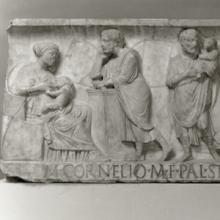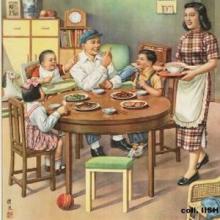Education
Conversations between the Catholic Church and the Polish Government
Poland was unique among Warsaw Pact countries in the degree of influence retained by the Catholic Church. But the church was also viewed as a powerful competitor to the state, and its leaders were among the first to be monitored and harassed during periods of social unrest.

Short Teaching Module: Roman Children’s Sarcophagi
I use images of two Roman marble sarcophagi for topics on children and childhood in undergraduate courses on ancient society, family, gender, representations, and historiography. The sarcophagi can be used to study one period of antiquity or to examine changing notions of childhood over time.

Short Teaching Module: Chinese Propaganda Posters
Visual images provide valuable material for the exploration of childhood, youth and history.
Writers of the Heian Era: Fiction, The Tale of Genji 2
The greatest work produced during the Heian era was The Tale of Genji by Murasaki Shikibu, lady-in-waiting to Empress Akiko. Considered the world’s first novel, Genji is written as an absorbing portrait of Heian court life, the splendor of its rituals, and aesthetic culture.
Soviet Dissidents and the "Brain Drain"
In the beginning of 1989, Henry Kissinger met with Mikhail Gorbachev for an informal conversation about the future of U.S.-Soviet cooperation, particularly concerning economic opportunities in the Soviet Union. The problem for U.S.-Soviet trade was the Jackson-Vanik Amendment to the 1974 U.S.
Gender and Health in Latin America: Personal Account, Education (Honduras)
Access to education and the willingness to learn are crucial ingredients to improve the health of women throughout the world. Good health depends on an understanding of the human body, but also requires the knowledge to maintain a healthy lifestyle.
British Empire: Fiction, Indian Tales of the Great Ones
Born in 1870 into a Parsee family in India, Cornelia Sorabji (1870–1954) became a writer and a lawyer. By the end of the Victorian period, many elite Indian men had traveled to Britain to study.
British Empire: Fiction, Nervous Conditions
In 1959, Tsitsi Dangarembga was born in Africa in the British colony known as Rhodesia, now called Zimbabwe. From the age of two, she spent four years living in Britain. On her return to Rhodesia, she attended a missionary school in Mutare.
British Empire: Letter, Mary Moffat
Mary Moffat (1795-1871) was the wife of Robert Moffat, the missionary for the London Missionary Society who established a mission center at Kuruman in southern Africa. Their daughter married David Livingstone.
Early Modern Period: Fiction, Gargantua and Pantagruel
The following passage comes from one of the most famous literary works of early modern Europe: François Rabelais’s Gargantua and Pantagruel, first published in four volumes between 1532 and 1552.